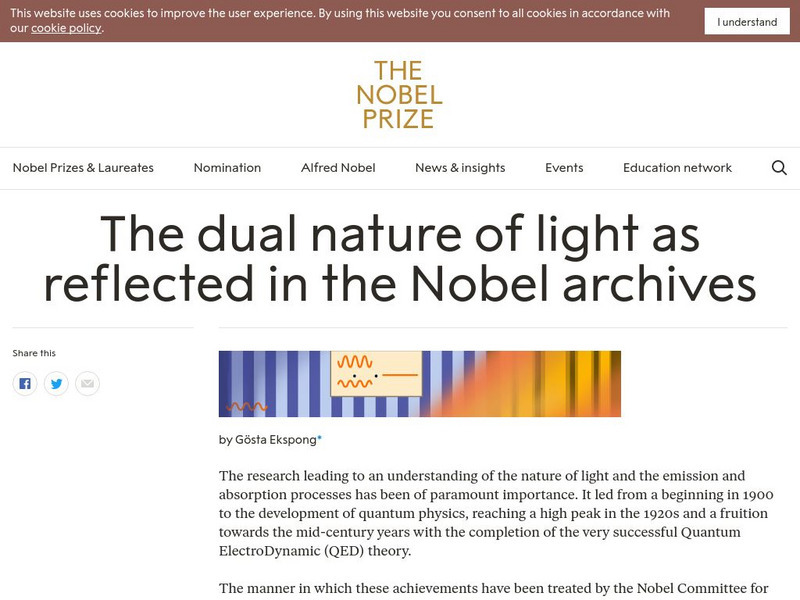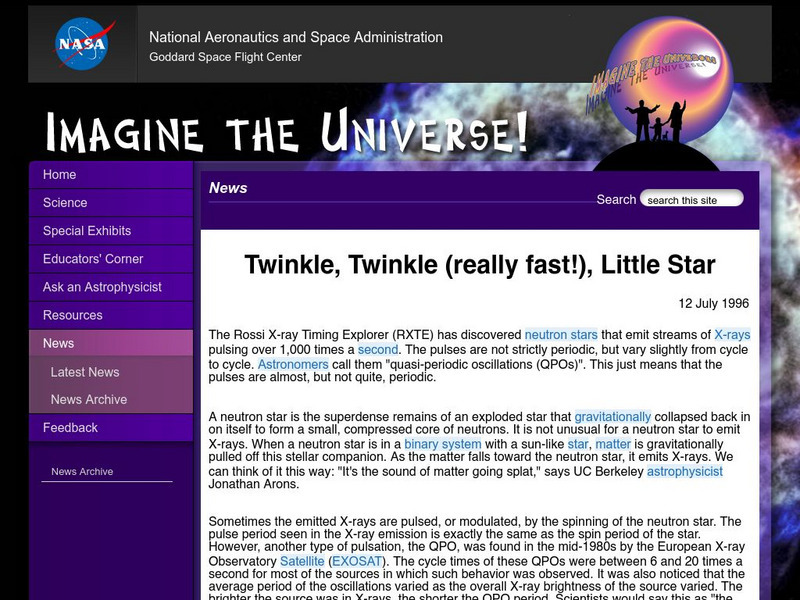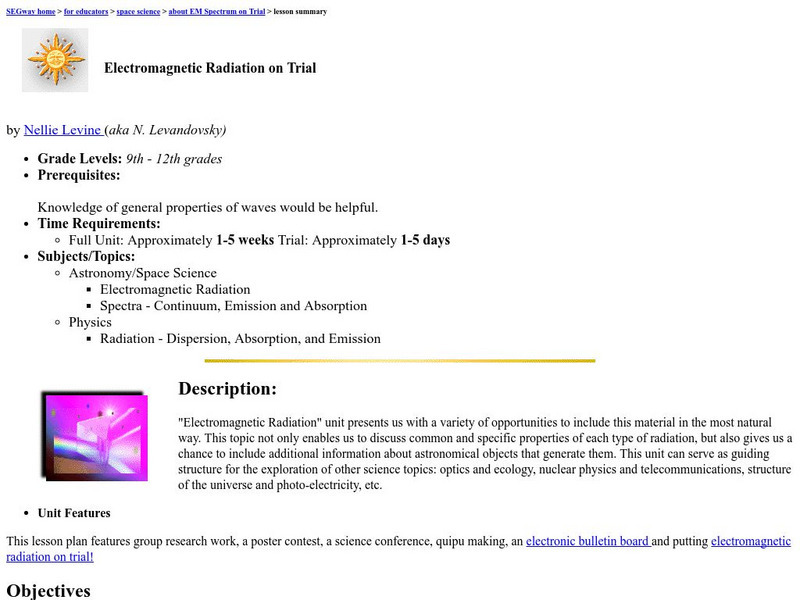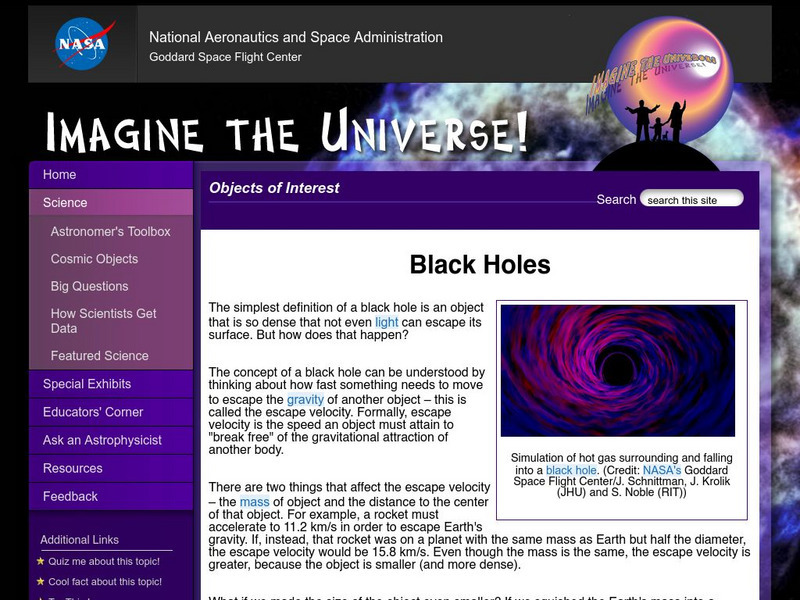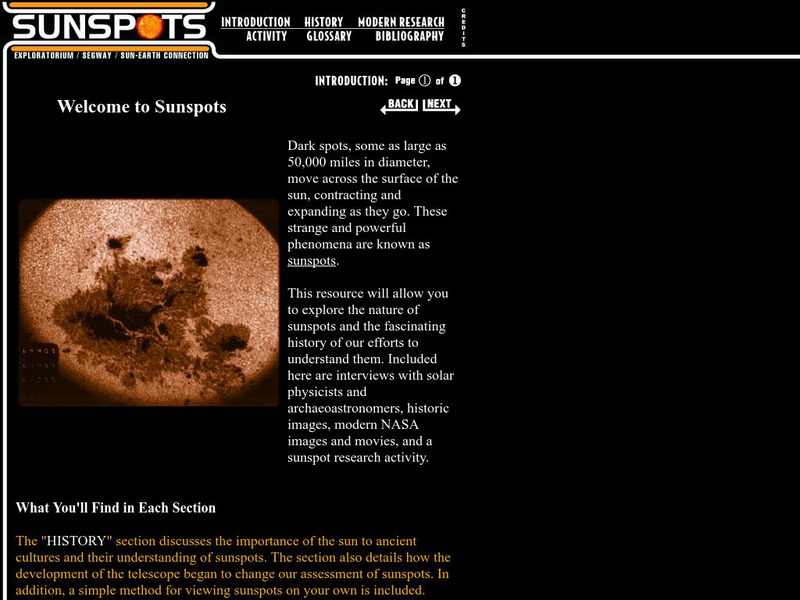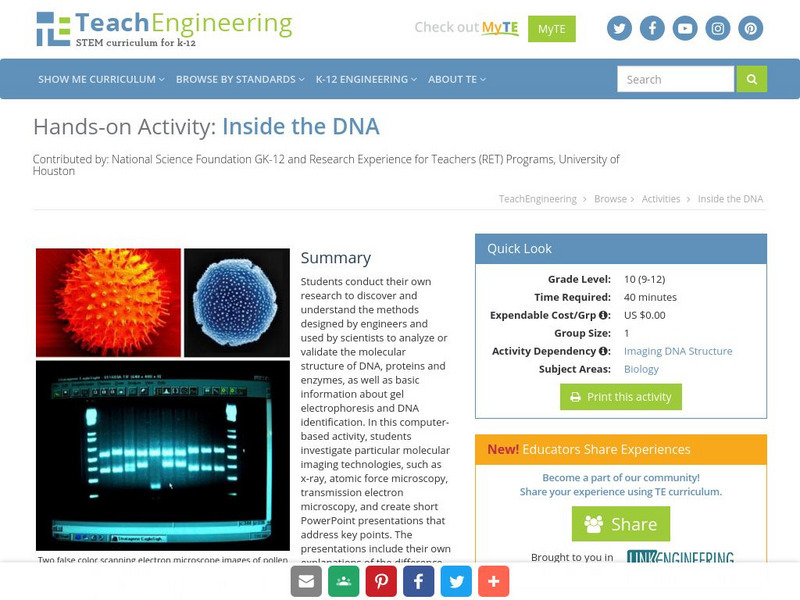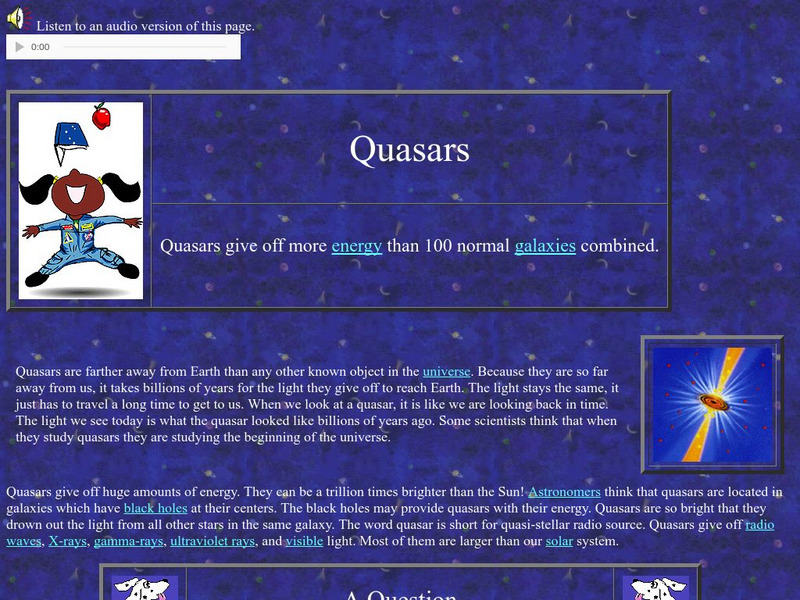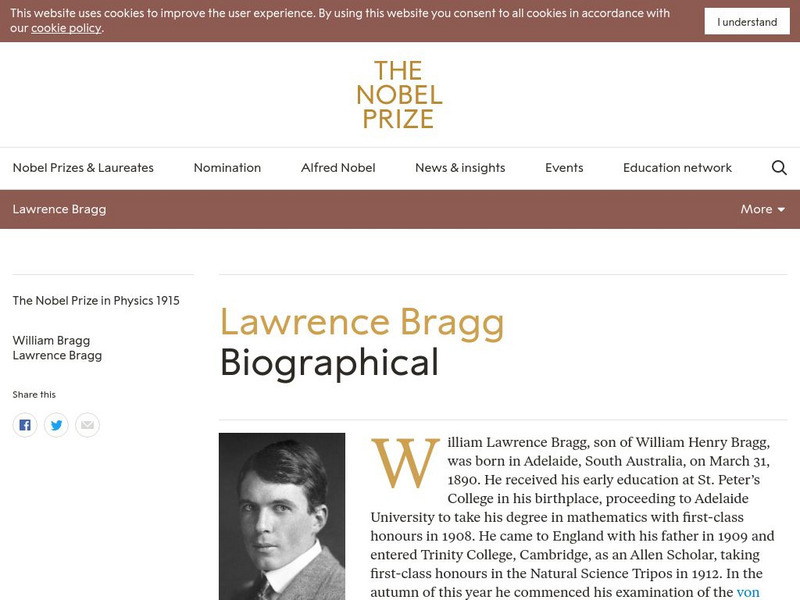Hi, what do you want to do?
Nobel Media AB
The Nobel Prize: The Dual Nature of Light as Reflected in the Nobel Archives
This article discusses the historical figures who contributed to our understanding of the nature of light, x-rays, Quantum ElectroDynamic (QED) theory, and so on.
Harvard University
Field Guide to X Ray Sources: Brown Dwarfs
Brown Dwarfs are explained. Includes illustrations.
Nobel Media AB
The Nobel Prize: Marie and Pierre Curie and the Discovery of Polonium and Radium
The Nobel Foundation provides a lecture given by Nanny Froman at the Royal Swedish Academy of Science in Sotckholm, Sweden. "Marie and Pierre Curie and the Discovery of Polonium and Radium" is organized into several sections including:...
Ducksters
Ducksters: Physics for Kids: Types of Electromagnetic Waves
Kids learn about the types of electromagnetic waves in the science of physics including microwaves, infrared, ultraviolet, radio, x-rays, and gamma rays.
NASA
Nasa: Imagine the Universe: "Twinkle, Twinkle (Really Fast!), Little Star"
"The Rossi X-ray Timing Explorer has discovered neutron stars that emit streams of X-rays pulsing over 1,000 times a second." Visit this site to read the rest of this article. Site offers additional resources as well as a Teacher's Corner.
University of California
Center Science Edu.: Electromagnetic Radiation on Trial
Here is a 1-5 day unit on electromagnetic radiation that features a teacher guide and student activities with extensions.
NASA
Nasa: Imagine the Universe: Black Holes
Learn what black holes are and the myths that surround them.
Harvard University
Harvard Smithsonian Center for Astrophysics: The Constellations
Based on images from the Chandra X-Ray Observatory, this is an excellent glossary of all the constellations, including the ones that make up the Zodiac. Find images, photographs, and an excellent background narratives concerning each...
University of California
Sunspots: The Exploratorium's Guide to Sunspots
Examine active X-Ray regions on the sun and the possible relationship to the sunspot cycle. Through an interactive exercise and readings, you are guided through the history of our Sun! Worksheets, assessments, and more are included.
Science Museum, London
Science Museum (London): Tutankhamen: Beneath the Mask
See and experience how modern science has been used to create a three-dimensional portrait of Tutankhamen, based not on Tut's famous golden but on X-rays of his mummy.
Science Buddies
Science Buddies: Career Profile: Nuclear Medicine Technologist
Nuclear medicine offers a look into the body that x-rays can't show. The nuclear medicine technologist is responsible for admininistering the the various tests that are afforded by nuclear medicine. The technologist can also be the one...
Other
Mozilla: Webmaker
Webmaker is a Mozilla project that people can use to create their own content through remixing web materials, and to deepen their understanding of how the Internet works. They provide starter projects, templates and event guides for...
Other
Simple Science: Hand It to the Animals
The innovative resource has students examine X-ray images of the ?hands? of different animals and then determine the function of each hand from its form. The activity has an interactive online version and a printable data sheet.
US National Library of Medicine
Medline Plus: Ivp (Intra Venous Pyelogram)
An intravenous pyelogram, or IVP, is an x-ray of the kidney and bladder. This tutorial explains the procedure and the benefits and risks.
TeachEngineering
Teach Engineering: Inside the Dna
Students conduct their own research to discover and understand the methods designed by engineers and used by scientists to analyze or validate the molecular structure of DNA, proteins and enzymes, as well as basic information about gel...
PBS
Pbs Kids: Dinosaur Train: Field Guide
The dinosaur train field guide is an A-Z glossary of dinosaurs for younger children. Each dinosaur has a colorful picture, and tabs showing an x-ray, a size comparison, the food it eats and some facts about it. The text is accompanied by...
Kinder Art
Kinder Art: Norval Morrisseau (Lesson Plan)
A wonderful educational art site from KinderArt that includes creating a work of art in a style similar to that of Morrisseau. Includes a short biography, art vocabulary, and information on Ojibwa culture.
NASA
Nasa Star Child: Quasars (Level 1)
Learn why quasars are the brightest things in the universe. Vocabulary words linked to a glossary of terms and a printable version are available.
NASA
Nasa Star Child: Comets (Level 1)
Younger students learn why comets race through the sky as well as related vocabulary words and meanings.
Nobel Media AB
The Nobel Prize: William Lawrence Bragg Biographical
The official Nobel biography of William Lawrence Bragg. the son of William Henry Bragg, who shared the 1915 Nobel Prize in Physics with his father. This article focuses on Bragg's science activities, positions, and achievements and honors.
CK-12 Foundation
Ck 12: Structure of the Atom
[Free Registration/Login may be required to access all resource tools.] Students learn about the important discoveries of subatomic particles, and how they led to our current understanding of the atom.
PBS
Pbs Learning Media: The Electromagnetic Spectrum: Frontline
This video segment adapted from FRONTLINE introduces the electromagnetic spectrum and explains how the various types of electromagnetic waves are distinguished by the amount of energy each wave carries.
Other
Space weather.com
Want to know what the current weather conditions are in space? Find everything here you may want to know about the latest solar flares, sunspots, asteroids and more. Site also includes essential web links to quench any user's thirst for...
Other popular searches
- Animal X Rays Preschool
- Animal X Rays
- X Rays Mri Bones
- Preschool Lessons X Rays
- X Rays Art Preschool
- Understanding X Rays
- Bones and X Rays
- X Rays and Scans
- X Rays Preschool
- X Rays Tech
- X Rays Tech Schools
- Radiation and X Rays





